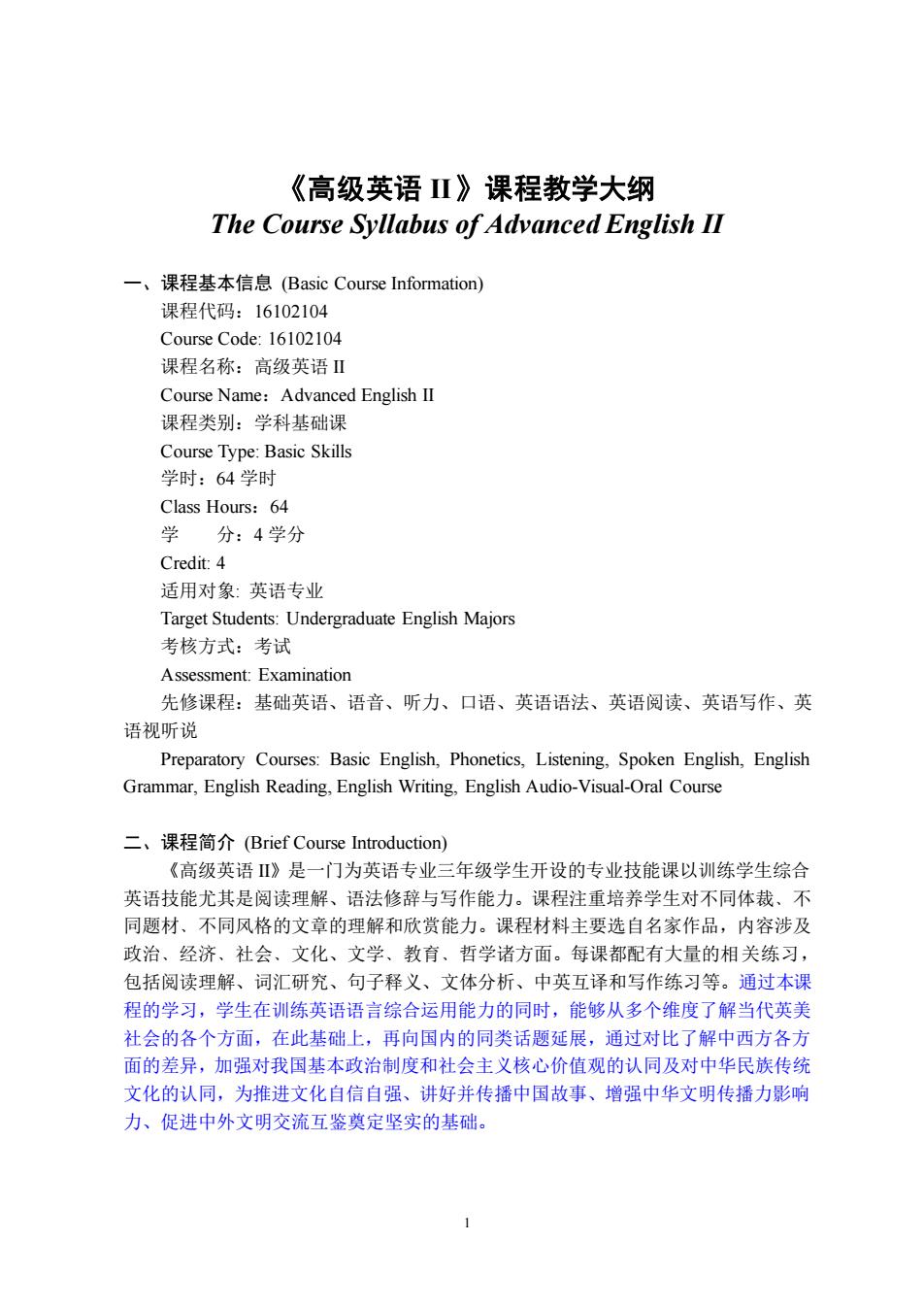
《高级英语Ⅱ》课程教学大纲 The Course Syllabus of Advanced English II -、课程基本信息(Basic Course Information) 课程代码:16102104 Course Code:16102104 课程名称:高级英语Ⅱ Course Name:Advanced English II 课程类别:学科基础课 Course Type:Basic Skills 学时:64学时 Class Hours:64 学分:4学分 Credit:4 适用对象:英语专业 Target Students:Undergraduate English Majors 老核方式:考试 Assessment:Examination 先修课程:基础英语、语音、听力、口语、英语语法、英语阅读、英语写作、英 语视听说 Preparatory Courses:Basic English,Phonetics,Listening.Spoken English,English Grammar,English Reading,English Writing,English Audio-Visual-Oral Course 二、课程简介(Brief Course Introduction) 《高级英语Ⅱ》是一门为英语专业三年级学生开设的专业技能课以训练学生综合 英语技能尤其是阅读理解、语法修辞与写作能力。课程注重培养学生对不同体裁、不 同题材、不同风格的文章的理解和欣赏能力。课程材料主要选自名家作品,内容涉及 改治、经济、社会、文化、文学、教育、哲学诸方面。每果都配有大量的相关练习, 包括阅读理解、词汇研究、句子释义、文体分析、中英互译和写作练习等。通过本课 程的学习,学生在训练英语语言综合运用能力的同时,能够从多个维度了解当代英美 社会的各个方面,在此基础上,再向国内的同类话题延展,通过对比了解中西方各方 面的差异,加强对我国基本政治制度和社会主义核心价值观的认同及对中华民族传统 文化的认同,为推进文化自信自强、讲好并传播中国故事、增强中华文明传播力影响 力、促进中外文明交流互鉴奠定坚实的基础。 1
1 《高级英语 II》课程教学大纲 The Course Syllabus of Advanced English II 一、课程基本信息 (Basic Course Information) 课程代码:16102104 Course Code: 16102104 课程名称:高级英语 II Course Name:Advanced English II 课程类别:学科基础课 Course Type: Basic Skills 学时:64 学时 Class Hours:64 学 分:4 学分 Credit: 4 适用对象: 英语专业 Target Students: Undergraduate English Majors 考核方式:考试 Assessment: Examination 先修课程:基础英语、语音、听力、口语、英语语法、英语阅读、英语写作、英 语视听说 Preparatory Courses: Basic English, Phonetics, Listening, Spoken English, English Grammar, English Reading, English Writing, English Audio-Visual-Oral Course 二、课程简介 (Brief Course Introduction) 《高级英语 II》是一门为英语专业三年级学生开设的专业技能课以训练学生综合 英语技能尤其是阅读理解、语法修辞与写作能力。课程注重培养学生对不同体裁﹑不 同题材﹑不同风格的文章的理解和欣赏能力。课程材料主要选自名家作品,内容涉及 政治﹑经济﹑社会﹑文化、文学﹑教育﹑哲学诸方面。每课都配有大量的相关练习, 包括阅读理解、词汇研究、句子释义、文体分析、中英互译和写作练习等。通过本课 程的学习,学生在训练英语语言综合运用能力的同时,能够从多个维度了解当代英美 社会的各个方面,在此基础上,再向国内的同类话题延展,通过对比了解中西方各方 面的差异,加强对我国基本政治制度和社会主义核心价值观的认同及对中华民族传统 文化的认同,为推进文化自信自强、讲好并传播中国故事、增强中华文明传播力影响 力、促进中外文明交流互鉴奠定坚实的基础
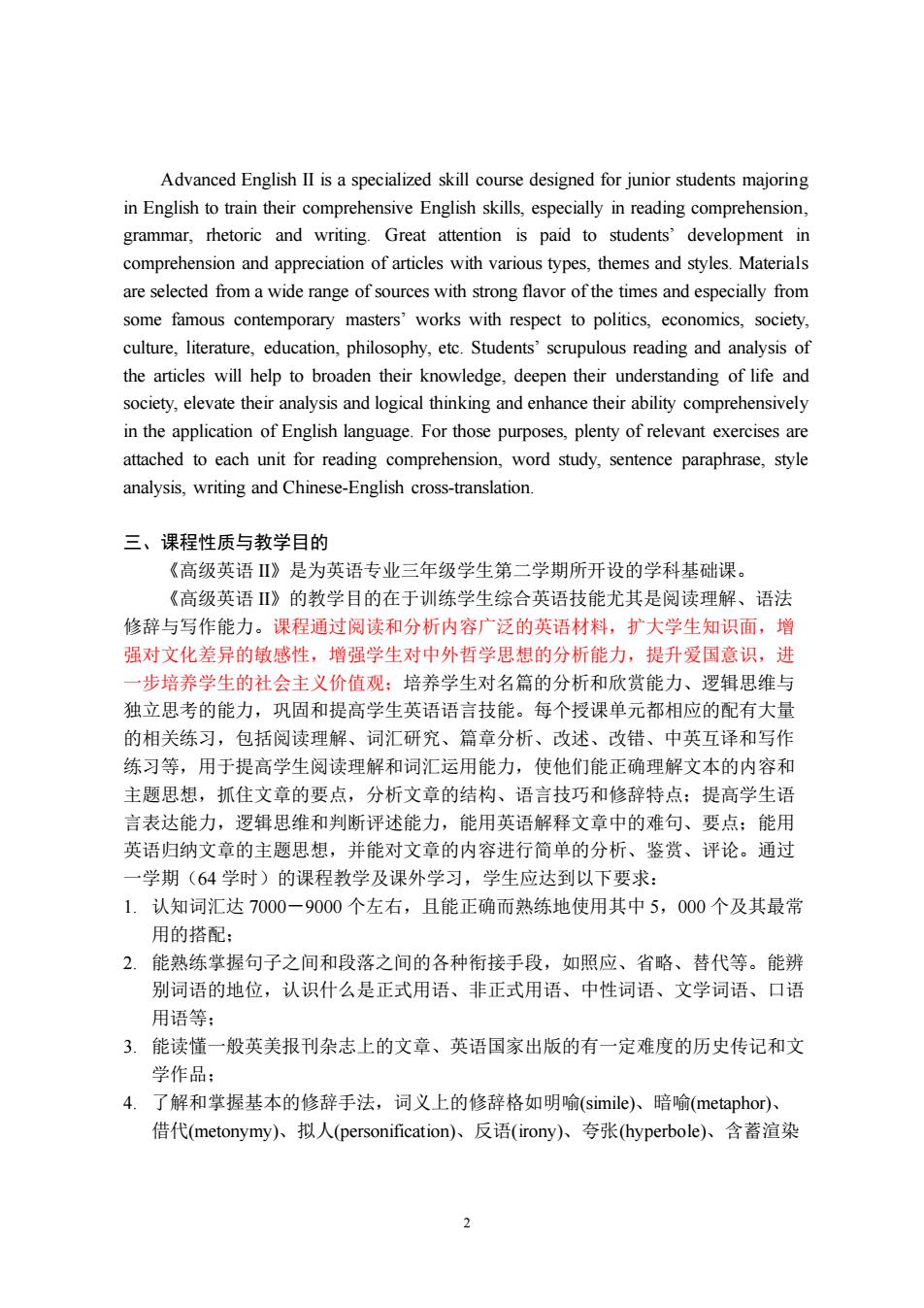
Advanced English II is a specialized skill course designed for junior students majoring in English to train their comprehensive English skills,especially in reading comprehension grammar,rhetoric and writing.Great attention is paid to students'development in comprehension and appreciation of articles with various types,themes and styles.Materials are selected from a wide range of sources with strong flavor of the times and especially from some famous contemporary masters'works with respect to politics.economics,society. culture,literature,education,philosophy,etc.Students'scrupulous reading and analysis of the articles will help to broaden their knowledge,deepen their understanding of life and society,elevate their analysis and logical thinking and enhance their ability comprehensively in the application of English language.For those purposes,plenty of relevant exercises are attached to each unit for reading comprehension,word study,sentence paraphrase.style analysis,writing and Chinese-English cross-translation. 三、课程性质与教学目的 《高级英语Ⅱ》是为英语专业三年级学生第二学期所开设的学科基础课, 《高级英语Ⅱ》的教学目的在于训练学生综合英语技能尤其是阅读理解、语法 修辞与写作能力。课程通过阅读和分析内容广泛的英语材料,扩大学生知识面,增 强对文化差异的敏感性,增强学生对中外哲学思想的分析能力,提升爱国意识,进 步培养学生的社会主义价值观:培养学生对名篇的分析和欣赏能力、逻辑思维与 独立思考的能力,巩固和提高学生英语语言技能。每个授课单元都相应的配有大量 的相关练习,包括阅读理解、词汇研究、篇章分析、改述、改错、中英互译和写作 练习等,用于提高学生阅读理解和词汇运用能力,使他们能正确理解文本的内容和 主题思想,抓住文章的要点,分析文章的结构、语言技巧和修辞特点:提高学生语 言表达能力,逻辑思维和判断评述能力,能用英语解释文章中的难句、要点:能用 英语归纳文章的主题思想,并能对文章的内容进行简单的分析、鉴赏、评论。通过 一学明(64学时)的课程数学及果外学习,学生应达到以下要求: 1.认知词汇达7000一9000个左右,且能正确而熟练地使用其中5,000个及其最常 用的塔配: 2.能熟练学握句子之间和段落之间的各种衔接手段,如照应、省略、替代等。能辨 别词语的地位,认识什么是正式用语、非正式用语、中性词语、文学词语、口语 用语等: 3.能读懂一般英美报刊杂志上的文章、英语国家出版的有一定难度的历史传记和文 学作品: 4.了解和掌握基本的修辞手法,词义上的修辞格如明喻((simile)、暗喻(metaphor)) 借代(metonymy)、拟人(personification)、反语(irony)夸张(hyperbole以、含蓄渲染
2 Advanced English II is a specialized skill course designed for junior students majoring in English to train their comprehensive English skills, especially in reading comprehension, grammar, rhetoric and writing. Great attention is paid to students’ development in comprehension and appreciation of articles with various types, themes and styles. Materials are selected from a wide range of sources with strong flavor of the times and especially from some famous contemporary masters’ works with respect to politics, economics, society, culture, literature, education, philosophy, etc. Students’ scrupulous reading and analysis of the articles will help to broaden their knowledge, deepen their understanding of life and society, elevate their analysis and logical thinking and enhance their ability comprehensively in the application of English language. For those purposes, plenty of relevant exercises are attached to each unit for reading comprehension, word study, sentence paraphrase, style analysis, writing and Chinese-English cross-translation. 三、课程性质与教学目的 《高级英语 II》是为英语专业三年级学生第二学期所开设的学科基础课。 《高级英语 II》的教学目的在于训练学生综合英语技能尤其是阅读理解、语法 修辞与写作能力。课程通过阅读和分析内容广泛的英语材料,扩大学生知识面,增 强对文化差异的敏感性,增强学生对中外哲学思想的分析能力,提升爱国意识,进 一步培养学生的社会主义价值观;培养学生对名篇的分析和欣赏能力、逻辑思维与 独立思考的能力,巩固和提高学生英语语言技能。每个授课单元都相应的配有大量 的相关练习,包括阅读理解、词汇研究、篇章分析、改述、改错、中英互译和写作 练习等,用于提高学生阅读理解和词汇运用能力,使他们能正确理解文本的内容和 主题思想,抓住文章的要点,分析文章的结构、语言技巧和修辞特点;提高学生语 言表达能力,逻辑思维和判断评述能力,能用英语解释文章中的难句、要点;能用 英语归纳文章的主题思想,并能对文章的内容进行简单的分析、鉴赏、评论。通过 一学期(64 学时)的课程教学及课外学习,学生应达到以下要求: 1. 认知词汇达 7000-9000 个左右,且能正确而熟练地使用其中 5,000 个及其最常 用的搭配; 2. 能熟练掌握句子之间和段落之间的各种衔接手段,如照应、省略、替代等。能辨 别词语的地位,认识什么是正式用语、非正式用语、中性词语、文学词语、口语 用语等; 3. 能读懂一般英美报刊杂志上的文章、英语国家出版的有一定难度的历史传记和文 学作品; 4. 了解和掌握基本的修辞手法,词义上的修辞格如明喻(simile)、暗喻(metaphor)、 借代(metonymy)、拟人(personification)、反语(irony)、夸张(hyperbole)、含蓄渲染
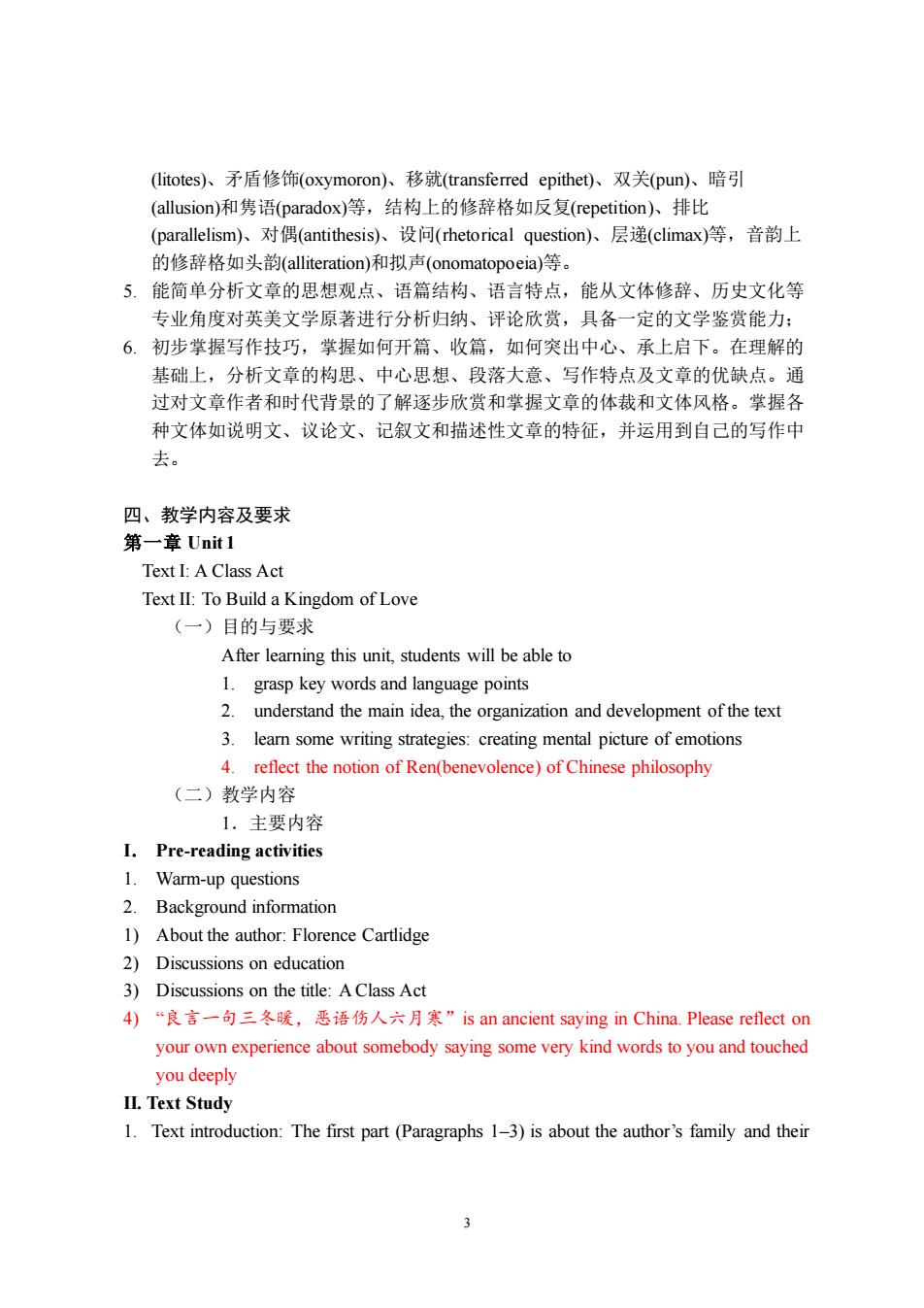
((litotes)、矛盾修饰(oxymoron)、移就((transferred epithet)、双关(pun)、暗引 (allusion)和隽语(paradox)等,结构上的修辞格如反复(repetition)、排比 (parallelism、对偶(antithesis)、设问(rhetorical question)、层递(climax)等,音韵上 的修辞格如头韵((alliteration)和拟声(onomatopoeia)等。 5.能简单分析文章的思想观点、语篇结构、语言特点,能从文体修辞、历史文化等 专业角度对英美文学原著进行分析归纳、评论欣赏,具备一定的文学鉴赏能力: 6.初步掌握写作技巧,掌握如何开篇、收篇,如何突出中心、承上启下。在理解的 基础上,分析文章的构思、中心思想、段落大意、写作特点及文章的优缺点。通 过对文章作者和时代背景的了解逐步欣赏和掌握文章的体裁和文体风格。掌握各 种文体如说明文、议论文、记叙文和描述性文章的特征,并运用到自己的写作中 去。 四、教学内容及要求 第一章Unit1 Text I:A Class Act Text II:To Build a Kingdom of Love (一)目的与要求 After learning this unit,students will be able to grasp key words and language points 2.understand the main idea,the organization and development of the text 3.leam some writing strategies:creating mental picture of emotions 4.reflect the notion of Ren(benevolence)of Chinese philosophy (二)教学内容 1.主要内容 I.Pre-reading activities 1.Warm-up questions 2.Background information 1)About the author:Florence Cartlidge 2)Discussions on education 3)Discussions on the title:A Class Act )“良言一句三冬暖,恶语伤人六月寒"is an ancient saying in China.Please reflect on your own experience about somebody saying some very kind words to you and touched you deeply II.Text Study 1.Text introduction:The first part (Paragraphs 1-3)is about the author's family and their 3
3 (litotes)、矛盾修饰(oxymoron)、移就(transferred epithet)、双关(pun)、暗引 (allusion)和隽语(paradox)等,结构上的修辞格如反复(repetition)、排比 (parallelism)、对偶(antithesis)、设问(rhetorical question)、层递(climax)等,音韵上 的修辞格如头韵(alliteration)和拟声(onomatopoeia)等。 5. 能简单分析文章的思想观点、语篇结构、语言特点,能从文体修辞、历史文化等 专业角度对英美文学原著进行分析归纳、评论欣赏,具备一定的文学鉴赏能力; 6. 初步掌握写作技巧,掌握如何开篇、收篇,如何突出中心、承上启下。在理解的 基础上,分析文章的构思、中心思想、段落大意、写作特点及文章的优缺点。通 过对文章作者和时代背景的了解逐步欣赏和掌握文章的体裁和文体风格。掌握各 种文体如说明文、议论文、记叙文和描述性文章的特征,并运用到自己的写作中 去。 四、教学内容及要求 第一章 Unit 1 Text I: A Class Act Text II: To Build a Kingdom of Love (一)目的与要求 After learning this unit, students will be able to 1. grasp key words and language points 2. understand the main idea, the organization and development of the text 3. learn some writing strategies: creating mental picture of emotions 4. reflect the notion of Ren(benevolence) of Chinese philosophy (二)教学内容 1.主要内容 I. Pre-reading activities 1. Warm-up questions 2. Background information 1) About the author: Florence Cartlidge 2) Discussions on education 3) Discussions on the title: A Class Act 4) “良言一句三冬暖,恶语伤人六月寒”is an ancient saying in China. Please reflect on your own experience about somebody saying some very kind words to you and touched you deeply II. Text Study 1. Text introduction: The first part (Paragraphs 1–3) is about the author’s family and their
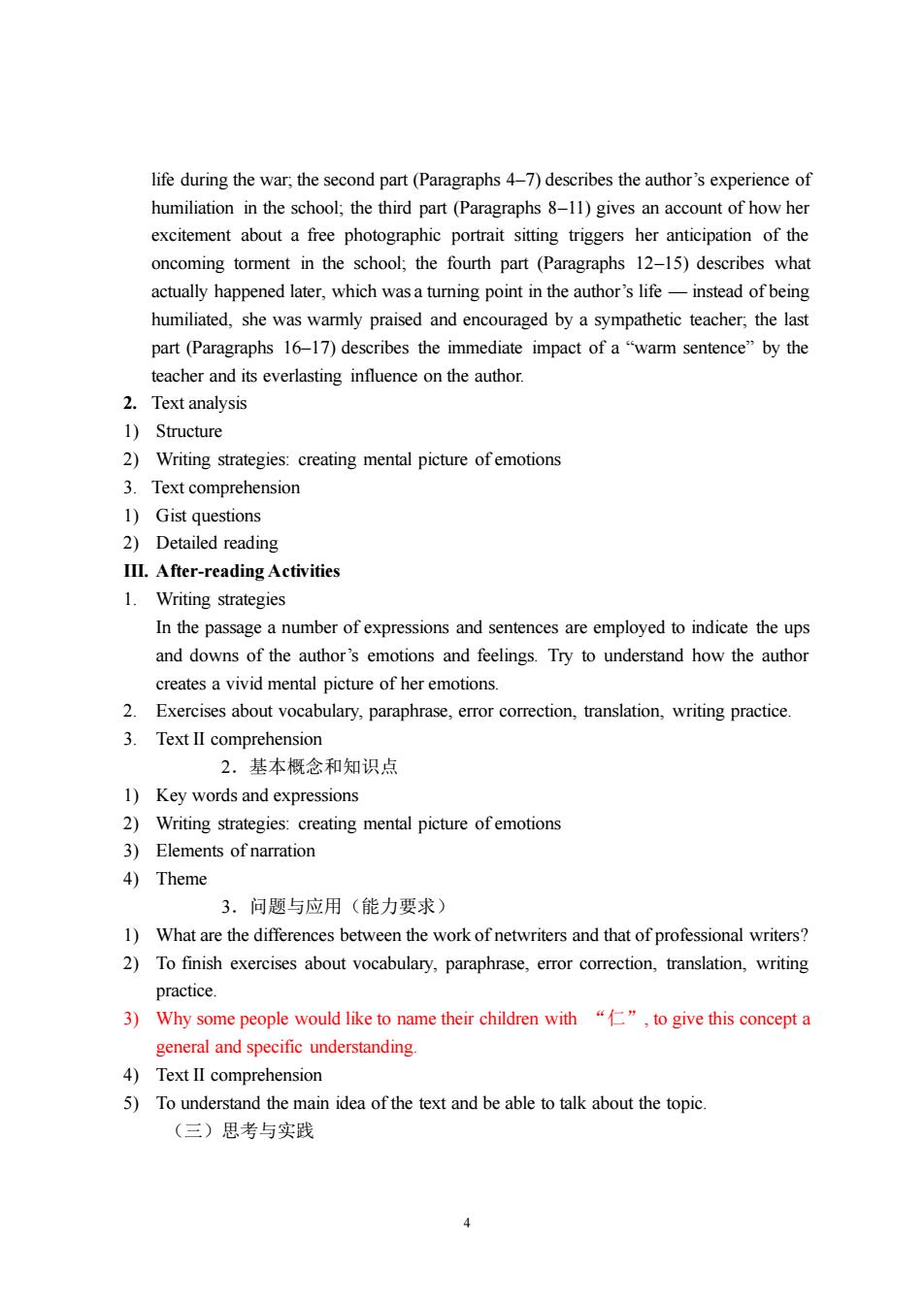
life during the war,the second part(Paragraphs 4-7)describes the author's experience of humiliation in the school;the third part(Paragraphs 8-11)gives an account of how her excitement about a free photographic portrait sitting triggers her anticipation of the oncoming torment in the school;the fourth part (Paragraphs 12-15)describes what actually happened later,which wasa turning point in the author's life-instead of being humiliated,she was warmly praised and encouraged by a sympathetic teacher:the last part(Paragraphs 16-17)describes the immediate impact of a"warm sentence"by the teacher and its everlasting influence on the author. 2.Text analysis 1)Structure 2)Writing strategies:creating mental picture of emotions 3.Text comprehension 1)Gist questions 2)Detailed reading III.After-reading Activitie 1.Writing strategies In the passage a number of expressions and sentences are employed to indicate the ups and downs of the author's emotions and feelings.Try to understand how the author creates a vivid mental picture of her emotions 2.Exercises about vocabulary,paraphrase,error correction,translation,writing practice. 3.Text II comprehension 2.基本概念和知识点 1)Key words and expressions 2)Writing strategies:creating mental picture ofemotions 3) Elements of narration 4)Theme 3.问题与应用(能力要求) 1)What are the differences between the work of netwriters and that of professional writers? 2)To finish exercises about vocabulary,paraphrase,error correction,translation,writing practice. 3)Why some people would like to name their children with“仁”,to give this concept a general and specific understanding 4)Text II comprehension 5)To understand the main idea of the text and be able to talk about the topic (三)思考与实践
4 life during the war; the second part (Paragraphs 4–7) describes the author’s experience of humiliation in the school; the third part (Paragraphs 8–11) gives an account of how her excitement about a free photographic portrait sitting triggers her anticipation of the oncoming torment in the school; the fourth part (Paragraphs 12–15) describes what actually happened later, which was a turning point in the author’s life — instead of being humiliated, she was warmly praised and encouraged by a sympathetic teacher; the last part (Paragraphs 16–17) describes the immediate impact of a “warm sentence” by the teacher and its everlasting influence on the author. 2. Text analysis 1) Structure 2) Writing strategies: creating mental picture of emotions 3. Text comprehension 1) Gist questions 2) Detailed reading III. After-reading Activities 1. Writing strategies In the passage a number of expressions and sentences are employed to indicate the ups and downs of the author’s emotions and feelings. Try to understand how the author creates a vivid mental picture of her emotions. 2. Exercises about vocabulary, paraphrase, error correction, translation, writing practice. 3. Text II comprehension 2.基本概念和知识点 1) Key words and expressions 2) Writing strategies: creating mental picture of emotions 3) Elements of narration 4) Theme 3.问题与应用(能力要求) 1) What are the differences between the work of netwriters and that of professional writers? 2) To finish exercises about vocabulary, paraphrase, error correction, translation, writing practice. 3) Why some people would like to name their children with “仁”, to give this concept a general and specific understanding. 4) Text II comprehension 5) To understand the main idea of the text and be able to talk about the topic. (三)思考与实践
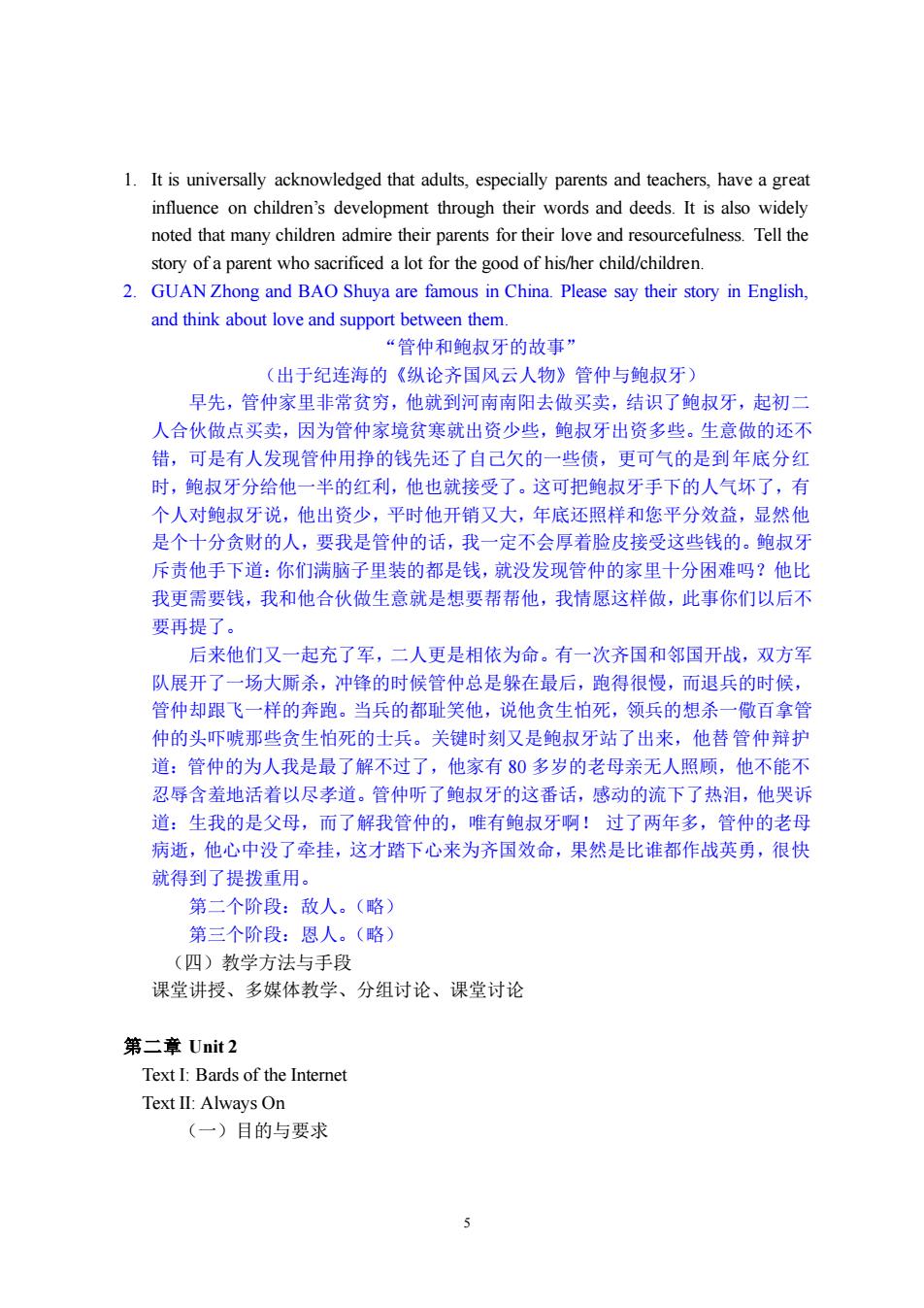
1.It is universally acknowledged that adults,especially parents and teachers,have a great influence on children's development through their words and deeds.It is also widely noted that many children admire their parents for their love and resourcefulness.Tell the story ofa parent who sacrificed a lot for the good of his/her child/children. 2.GUAN Zhong and BAO Shuya are famous in China.Please say their story in English. and think about love and support between them. “管仲和鲍叔牙的故事” (出于纪连海的《纵论齐国风云人物》管仲与鲍叔牙) 早先,管仲家里非常贫穷,他就到河南南阳去做买卖,结识了鲍叔牙,起初二 人合伙做点买卖,因为管仲家境贫寒就出资少些,鲍叔牙出资多些。生意做的还不 错,可是有人发现管仲用挣的钱先还了自己欠的一些债,更可气的是倒年底分红 时,鲍叔牙分给他一半的红利,他也就接受了。这可把鲍叔牙手下的人气坏了,有 个人对的叔牙说,他出资少,平时他开销又大,年底不昭样和你平分效益,思姚他 是个十分贪财的人,要我是管仲的话,我一定不会厚着脸皮接受这些钱的。鲍叔牙 斥责他手下道:你们满脑子里装的都是钱,就没发现管仲的家里十分困难吗?他比 我更需要钱,我和他合伙做生意就是想要帮帮他,我情愿这样做,此事你们以后不 要再提了。 后来他们又一起充了军,二人更是相依为命。有一次齐国和邻国开战,双方军 队展开了一场大厮杀,冲锋的时候管仲总是躲在最后,跑得很慢,而退兵的时候, 管仲却跟飞一样的奔跑。当兵的都耻笑他,说他贪生怕死,领兵的想杀一儆百拿管 仲的头吓唬那些贪生怕死的士兵。关键时刻又是鲍叔牙站了出来,他替管仲辩护 道:管仲的为人我是最了解不过了,他家有80多岁的老母亲无人照顾,他不能不 忍辱含羞地活着以尽孝道。管仲听了鲍叔牙的这番话,感动的流下了热泪,他哭诉 道:生我的是父母,而了解我管仲的,唯有鲍叔牙啊!过了两年多,管仲的老母 病逝,他心中没了牵挂,这才踏下心来为齐国效命,果然是比谁都作战英勇,很快 就得到了提拨重用。 第二个阶段:敌人。(略) 第三个阶段:恩人。(略) (四)教学方法与手段 课堂讲授、多媒体教学、分组讨论、课堂讨论 第二章Unit2 Text I:Bards of the Internet Text II:Always On (一)目的与要求 5
5 1. It is universally acknowledged that adults, especially parents and teachers, have a great influence on children’s development through their words and deeds. It is also widely noted that many children admire their parents for their love and resourcefulness. Tell the story of a parent who sacrificed a lot for the good of his/her child/children. 2. GUAN Zhong and BAO Shuya are famous in China. Please say their story in English, and think about love and support between them. “管仲和鲍叔牙的故事” (出于纪连海的《纵论齐国风云人物》管仲与鲍叔牙) 早先,管仲家里非常贫穷,他就到河南南阳去做买卖,结识了鲍叔牙,起初二 人合伙做点买卖,因为管仲家境贫寒就出资少些,鲍叔牙出资多些。生意做的还不 错,可是有人发现管仲用挣的钱先还了自己欠的一些债,更可气的是到年底分红 时,鲍叔牙分给他一半的红利,他也就接受了。这可把鲍叔牙手下的人气坏了,有 个人对鲍叔牙说,他出资少,平时他开销又大,年底还照样和您平分效益,显然他 是个十分贪财的人,要我是管仲的话,我一定不会厚着脸皮接受这些钱的。鲍叔牙 斥责他手下道:你们满脑子里装的都是钱,就没发现管仲的家里十分困难吗?他比 我更需要钱,我和他合伙做生意就是想要帮帮他,我情愿这样做,此事你们以后不 要再提了。 后来他们又一起充了军,二人更是相依为命。有一次齐国和邻国开战,双方军 队展开了一场大厮杀,冲锋的时候管仲总是躲在最后,跑得很慢,而退兵的时候, 管仲却跟飞一样的奔跑。当兵的都耻笑他,说他贪生怕死,领兵的想杀一儆百拿管 仲的头吓唬那些贪生怕死的士兵。关键时刻又是鲍叔牙站了出来,他替管仲辩护 道:管仲的为人我是最了解不过了,他家有 80 多岁的老母亲无人照顾,他不能不 忍辱含羞地活着以尽孝道。管仲听了鲍叔牙的这番话,感动的流下了热泪,他哭诉 道:生我的是父母,而了解我管仲的,唯有鲍叔牙啊! 过了两年多,管仲的老母 病逝,他心中没了牵挂,这才踏下心来为齐国效命,果然是比谁都作战英勇,很快 就得到了提拨重用。 第二个阶段:敌人。(略) 第三个阶段:恩人。(略) (四)教学方法与手段 课堂讲授、多媒体教学、分组讨论、课堂讨论 第二章 Unit 2 Text I: Bards of the Internet Text II: Always On (一)目的与要求
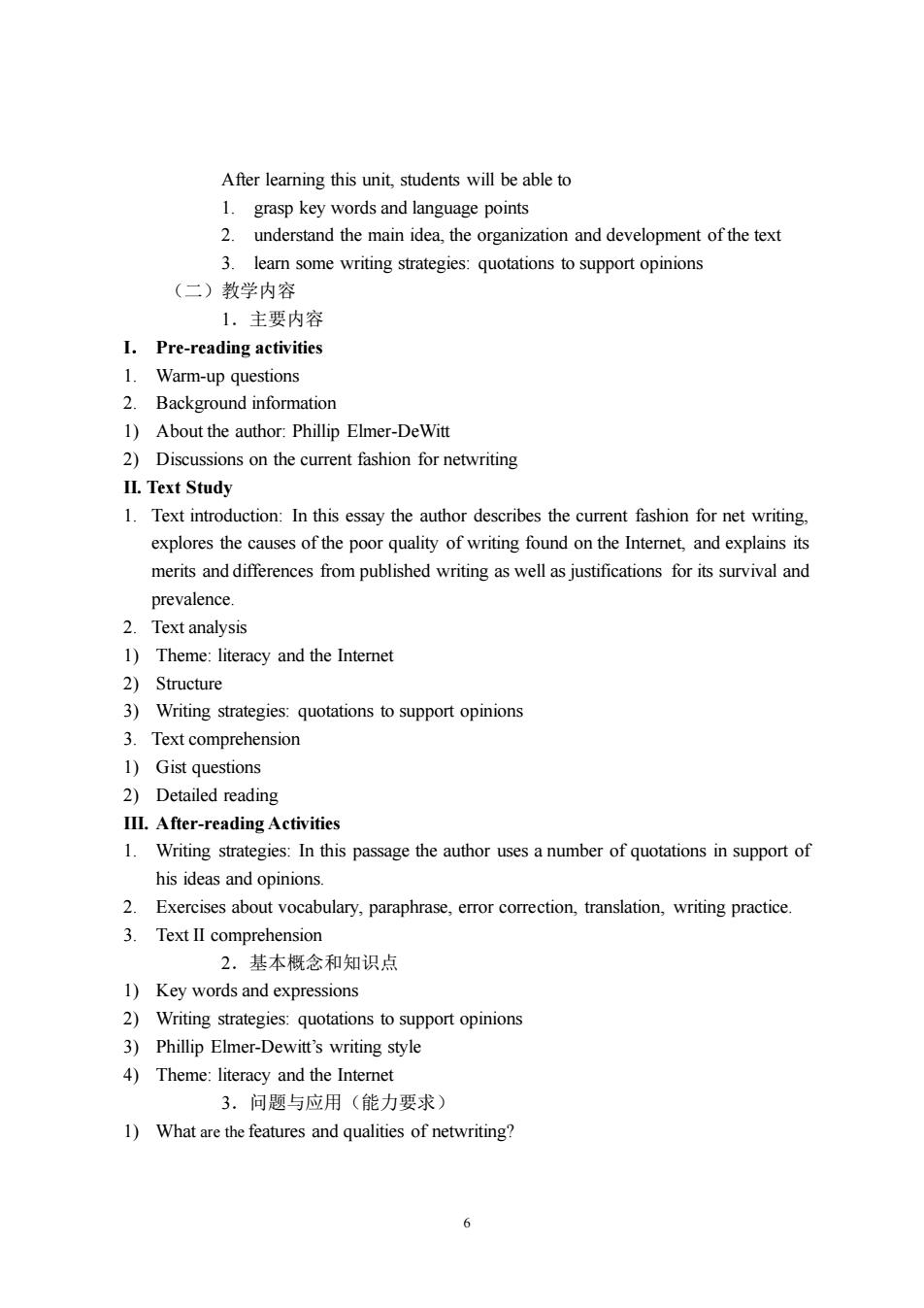
After leamning this unit,students will be able to 1.grasp key words and language points 2.understand the main idea,the organization and development of the text 3.leamn some writing strategies:quotations to support opinions (二)教学内容 1.主要内容 I.Pre-reading activities 1.Warm-up questions 2.Background information 1)About the author:Phillip Elmer-DeWitt 2)Discussions on the current fashion for netwriting II.Text Study 1.Text introduction:In this essay the author describes the current fashion for net writing. explores the causes of the poor quality of writing found on the Internet,and explains its merits and differences from published writing as well as justifications for its survival and prevalence. 2.Text analysis 1)Theme:literacy and the Internet 2)Structure 3)Writing strategies:quotations to support opinions 3.Text comprehension 1)Gist questions 2)Detailed reading III.After-reading Activities Writing strategies:In this passage the author uses a number of quotations in support of his ideas and opinions. 2.Exercises about vocabulary,paraphrase,error correction,translation,writing practice. 3.Text II comprehension 2.基本概念和知识点 1)Key words and expressions 2)Writing strategies:quotations to support opinions 3)Phillip Elmer-Dewitt's writing style 4)Theme:literacy and the Internet 3.问题与应用(能力要求》 1)What are the features and qualities of netwriting? 6
6 After learning this unit, students will be able to 1. grasp key words and language points 2. understand the main idea, the organization and development of the text 3. learn some writing strategies: quotations to support opinions (二)教学内容 1.主要内容 I. Pre-reading activities 1. Warm-up questions 2. Background information 1) About the author: Phillip Elmer-DeWitt 2) Discussions on the current fashion for netwriting II. Text Study 1. Text introduction: In this essay the author describes the current fashion for net writing, explores the causes of the poor quality of writing found on the Internet, and explains its merits and differences from published writing as well as justifications for its survival and prevalence. 2. Text analysis 1) Theme: literacy and the Internet 2) Structure 3) Writing strategies: quotations to support opinions 3. Text comprehension 1) Gist questions 2) Detailed reading III. After-reading Activities 1. Writing strategies: In this passage the author uses a number of quotations in support of his ideas and opinions. 2. Exercises about vocabulary, paraphrase, error correction, translation, writing practice. 3. Text II comprehension 2.基本概念和知识点 1) Key words and expressions 2) Writing strategies: quotations to support opinions 3) Phillip Elmer-Dewitt’s writing style 4) Theme: literacy and the Internet 3.问题与应用(能力要求) 1) What are the features and qualities of netwriting?
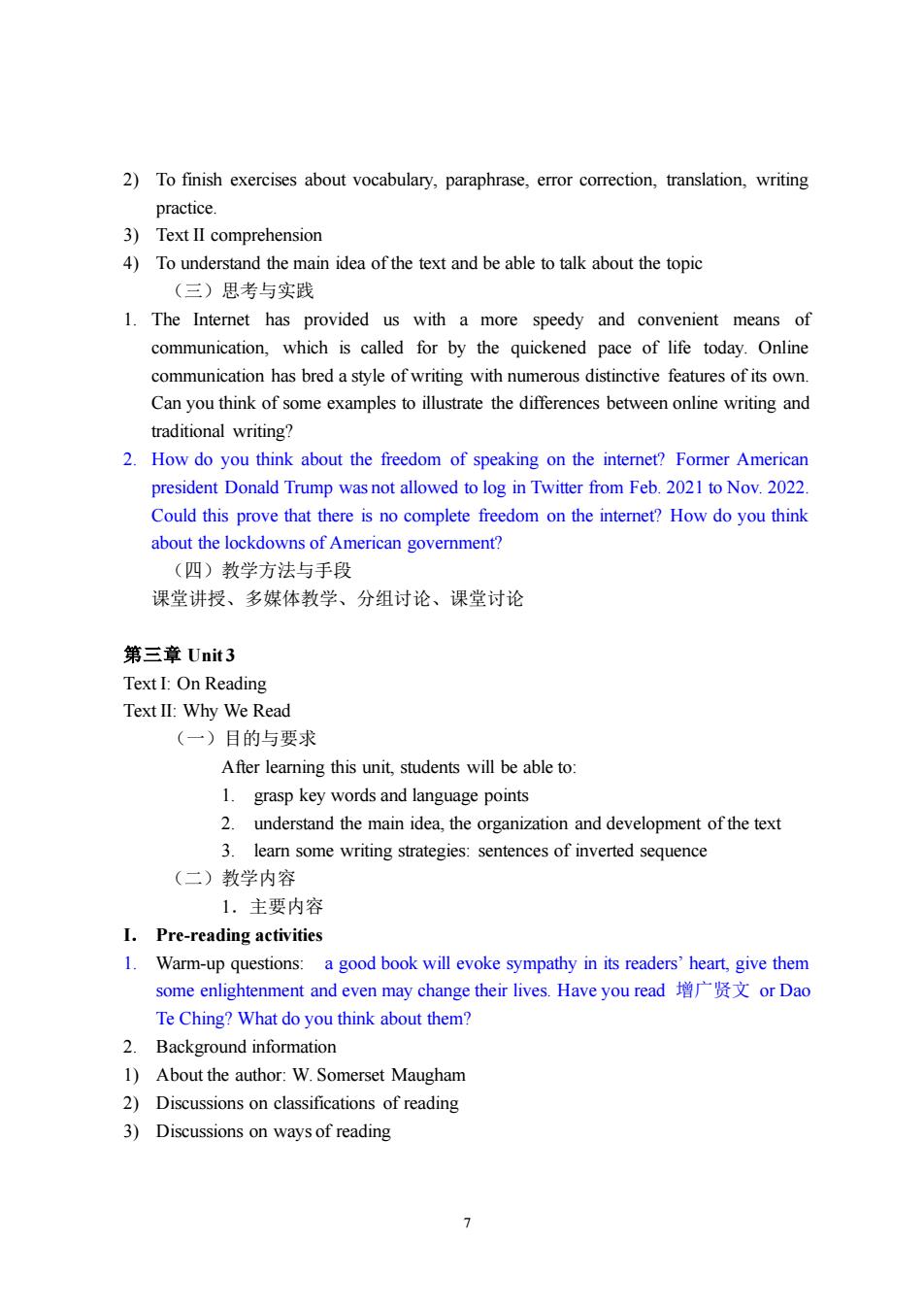
2)To finish exercises about vocabulary,paraphrase,error correction,translation,writing practice 3)Text II comprehension 4)To understand the main idea of the text and be able to talk about the topic (三)思考与实践 1.The Internet has provided us with a more speedy and convenient means of communication,which is called for by the quickened pace of life today.Online communication has bred a style of writing with numerous distinctive features of its own. Can you think of some examples to illustrate the differences between online writing and traditional writing? 2.How do you think about the freedom of speaking on the internet?Former American president Donald Trump was not allowed to log in Twitter from Feb.2021 to Nov.2022. Could this prove that there is no complete freedom on the interet?How do you think about the lockdowns of American government? (四)教学方法与手段 课堂讲授、多媒体教学、分组讨论、课堂讨论 第三章Unit3 Text I:On Reading Text II:Why We Read (一)目的与要求 After leamning this unit,students will be able to: 1 grasp key words and language points 2.understand the main idea,the organization and development of the text 3 leam some writing strategies:sentences of inverted sequence (二)教学内容 1.主要内容 I.Pre-reading activities 1.Warm-up questions:a good book will evoke sympathy in its readers'heart,give them some enlightenment and even may change their lives.Have you read增广贤文or Dao Te Ching?What do you think about them? 2 Background information 1)About the author:W.Somerset Maugham 2)Discussions on classifications of reading 3)Discussions on ways of reading 7
7 2) To finish exercises about vocabulary, paraphrase, error correction, translation, writing practice. 3) Text II comprehension 4) To understand the main idea of the text and be able to talk about the topic (三)思考与实践 1. The Internet has provided us with a more speedy and convenient means of communication, which is called for by the quickened pace of life today. Online communication has bred a style of writing with numerous distinctive features of its own. Can you think of some examples to illustrate the differences between online writing and traditional writing? 2. How do you think about the freedom of speaking on the internet? Former American president Donald Trump was not allowed to log in Twitter from Feb. 2021 to Nov. 2022. Could this prove that there is no complete freedom on the internet? How do you think about the lockdowns of American government? (四)教学方法与手段 课堂讲授、多媒体教学、分组讨论、课堂讨论 第三章 Unit 3 Text I: On Reading Text II: Why We Read (一)目的与要求 After learning this unit, students will be able to: 1. grasp key words and language points 2. understand the main idea, the organization and development of the text 3. learn some writing strategies: sentences of inverted sequence (二)教学内容 1.主要内容 I. Pre-reading activities 1. Warm-up questions: a good book will evoke sympathy in its readers’ heart, give them some enlightenment and even may change their lives. Have you read 增广贤文 or Dao Te Ching? What do you think about them? 2. Background information 1) About the author: W. Somerset Maugham 2) Discussions on classifications of reading 3) Discussions on ways of reading
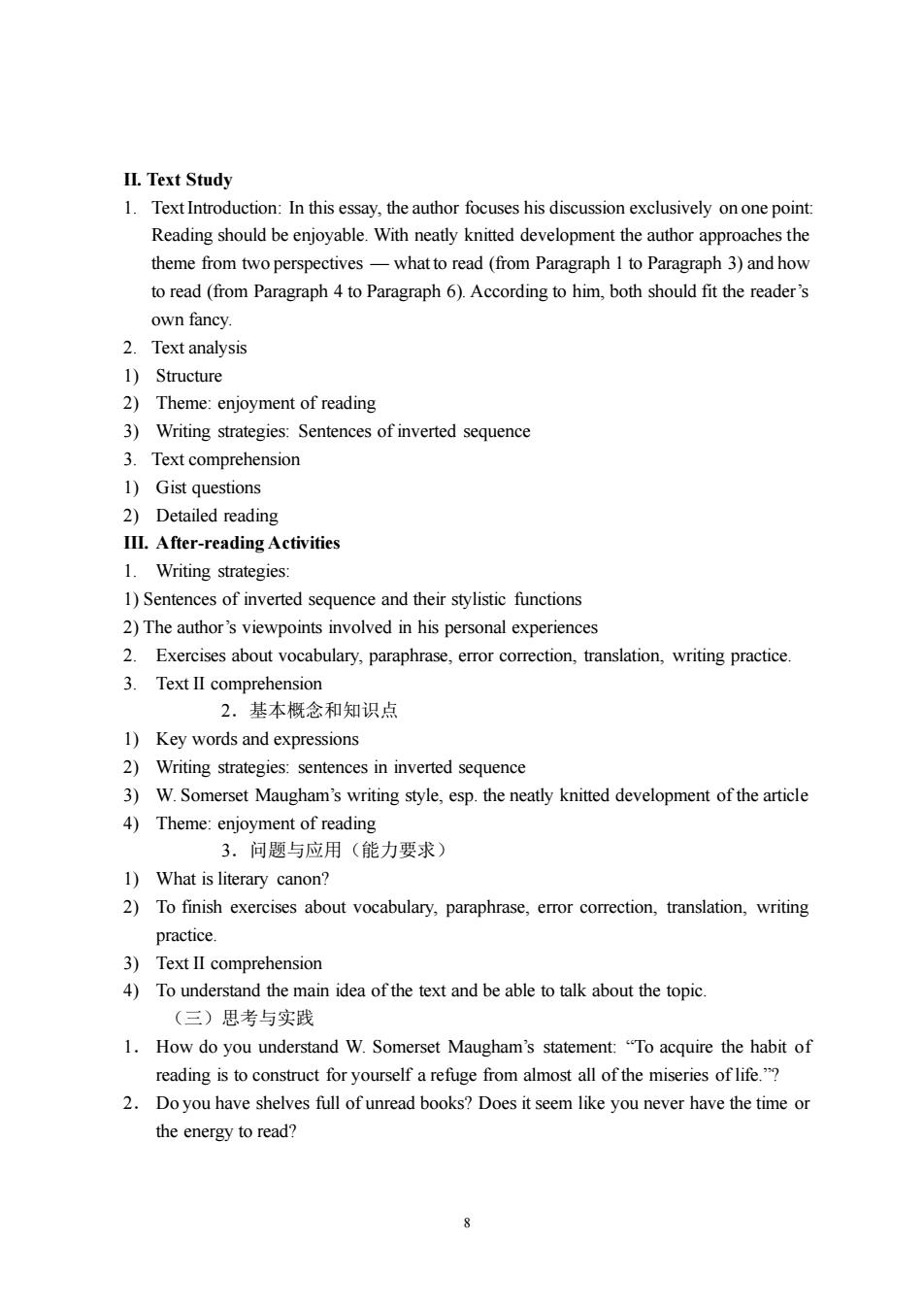
II.Text Study 1.Text Introduction:In this essay,the author focuses his discussion exclusively on one point Reading should be enjoyable.With neatly knitted development the author approaches the theme from two perspectives-what to read(from Paragraph I to Paragraph 3)and how to read(from Paragraph 4 to Paragraph 6).According to him,both should fit the reader's own fancy. 2.Text analysis 1)Structure 2)Theme:enjoyment of reading 3)Writing strategies:Sentences of inverted sequence 3.Textcomprehension 1)Gist questions 2)Detailed reading III.After-reading Activities 1.Writing strategies: 1)Sentences of inverted sequence and their stylistic functions 2)The author's viewpoints involved in his personal experiences 2.Exercises about vocabulary,paraphrase,error correction,translation,writing practice. 3.Text II comprehension 2.基本概念和知识点 1)Key words and expressions 2)Writing strategies:sentences in inverted sequence 3)W.Somerset Maugham's writing style,esp.the neatly knitted development of the article 4)Theme:enjoyment of reading 3.问题与应用(能力要求 1)What is literary canon? 2)To finish exercises about vocabulary,paraphrase,error correction,translation,writing practice 3)Text II comprehension 4)To understand the main idea of the text and be able to talk about the topic (三)思考与实践 1.How do you understand W.Somerset Maugham's statement:"To acquire the habit of reading is to construct for yourself a refuge from almost all of the miseries of life."? 2.Do you have shelves full of unread books?Does it seem like you never have the time or the energy to read? 8
8 II. Text Study 1. Text Introduction: In this essay, the author focuses his discussion exclusively on one point: Reading should be enjoyable. With neatly knitted development the author approaches the theme from two perspectives — what to read (from Paragraph 1 to Paragraph 3) and how to read (from Paragraph 4 to Paragraph 6). According to him, both should fit the reader’s own fancy. 2. Text analysis 1) Structure 2) Theme: enjoyment of reading 3) Writing strategies: Sentences of inverted sequence 3. Text comprehension 1) Gist questions 2) Detailed reading III. After-reading Activities 1. Writing strategies: 1) Sentences of inverted sequence and their stylistic functions 2) The author’s viewpoints involved in his personal experiences 2. Exercises about vocabulary, paraphrase, error correction, translation, writing practice. 3. Text II comprehension 2.基本概念和知识点 1) Key words and expressions 2) Writing strategies: sentences in inverted sequence 3) W. Somerset Maugham’s writing style, esp. the neatly knitted development of the article 4) Theme: enjoyment of reading 3.问题与应用(能力要求) 1) What is literary canon? 2) To finish exercises about vocabulary, paraphrase, error correction, translation, writing practice. 3) Text II comprehension 4) To understand the main idea of the text and be able to talk about the topic. (三)思考与实践 1. How do you understand W. Somerset Maugham’s statement: “To acquire the habit of reading is to construct for yourself a refuge from almost all of the miseries of life.”? 2. Do you have shelves full of unread books? Does it seem like you never have the time or the energy to read?
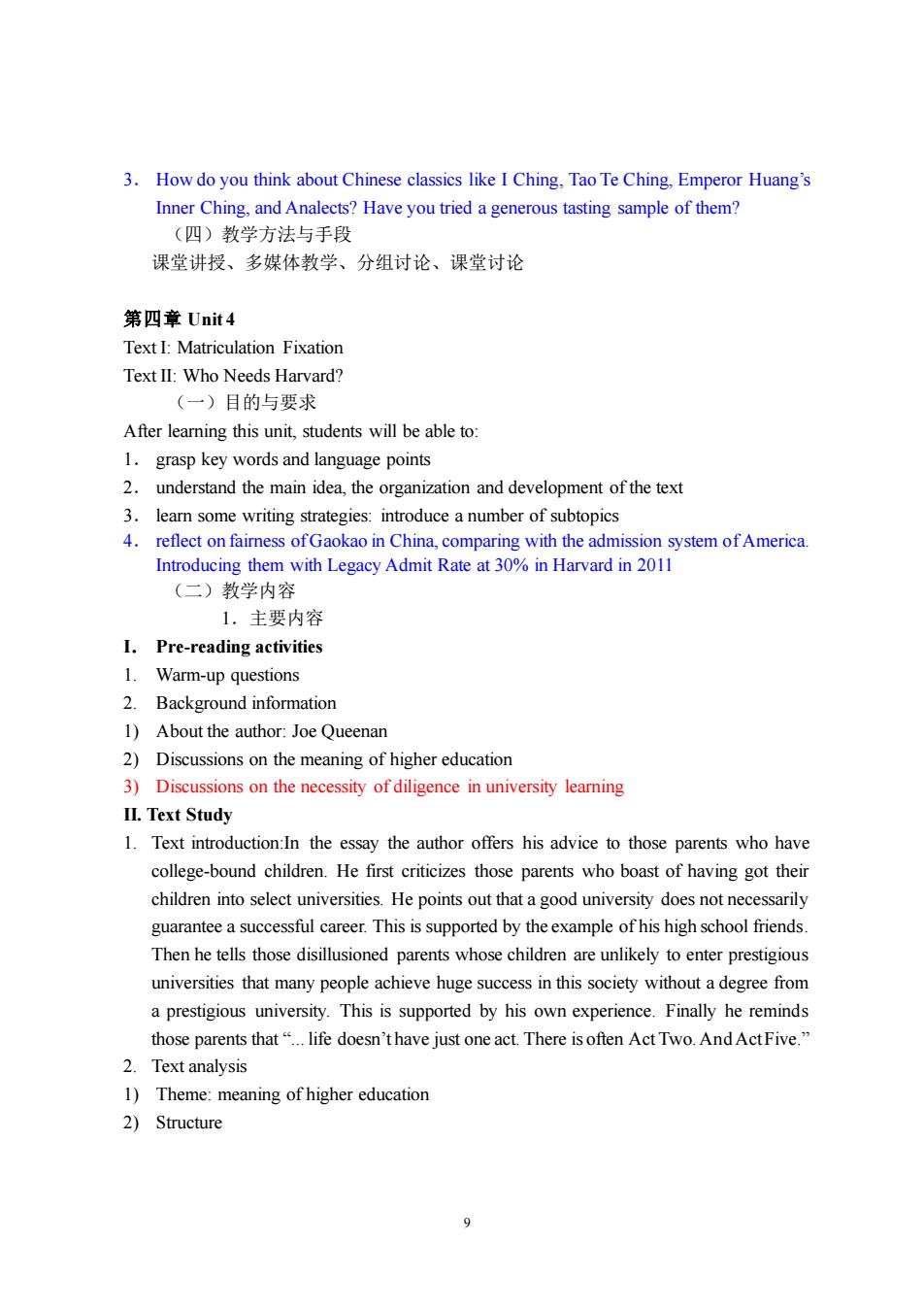
3.How do you think about Chinese classics like I Ching,Tao Te Ching.Emperor Huang's Inner Ching,and Analects?Have you tried a generous tasting sample of them? (四)教学方法与手段 课堂讲授、多媒体教学、分组讨论、课堂讨论 第四章Unit4 Text I:Matriculation Fixation Text II:Who Needs Harvard? (一)目的与要求 After learning this unit,students will be able to: 1.grasp key words and language points 2. understand the main idea,the organization and development of the text 3.learn some writing strategies:introduce a number of subtopics 4. reflect on faimess ofGaokao in China,comparing with the admission system of America Introducing them with Legacy Admit Rate at 30%in Harvard in 2011 (二)教学内容 1.主要内容 I.Pre-reading activities 1.Warm-up questions 2.Background information 1)About the author:Joe Queenan 2)Discussions on the meaning of higher education 3)Discussions on the necessity of diligence in university learning II.Text Study 1.Text introduction:In the essay the author offers his advice to those parents who have college-bound children.He first criticizes those parents who boast of having got their children into select universities.He points out that a good university does not necessarily guarantee a successful career.This is supported by the example ofhis high school friends. Then he tells those disillusioned parents whose children are unlikely to enter prestigious universities that many people achieve huge success in this society without a degree from a prestigious university.This is supported by his own experience.Finally he reminds those parents that"life doesn'thave just one act.There is often Act Two.And ActFive." 2.Text analysis 1)Theme:meaning of higher education 2)Structure
9 3. How do you think about Chinese classics like I Ching, Tao Te Ching, Emperor Huang’s Inner Ching, and Analects? Have you tried a generous tasting sample of them? (四)教学方法与手段 课堂讲授、多媒体教学、分组讨论、课堂讨论 第四章 Unit 4 Text I: Matriculation Fixation Text II: Who Needs Harvard? (一)目的与要求 After learning this unit, students will be able to: 1. grasp key words and language points 2. understand the main idea, the organization and development of the text 3. learn some writing strategies: introduce a number of subtopics 4. reflect on fairness of Gaokao in China, comparing with the admission system of America. Introducing them with Legacy Admit Rate at 30% in Harvard in 2011 (二)教学内容 1.主要内容 I. Pre-reading activities 1. Warm-up questions 2. Background information 1) About the author: Joe Queenan 2) Discussions on the meaning of higher education 3) Discussions on the necessity of diligence in university learning II. Text Study 1. Text introduction:In the essay the author offers his advice to those parents who have college-bound children. He first criticizes those parents who boast of having got their children into select universities. He points out that a good university does not necessarily guarantee a successful career. This is supported by the example of his high school friends. Then he tells those disillusioned parents whose children are unlikely to enter prestigious universities that many people achieve huge success in this society without a degree from a prestigious university. This is supported by his own experience. Finally he reminds those parents that “... life doesn’t have just one act. There is often Act Two. And Act Five.” 2. Text analysis 1) Theme: meaning of higher education 2) Structure

3)Writing strategies:introduce a number of subtopics 3.Text comprehension 1)Gist questions 2)Detailed reading III.After-reading Activities 1.Writing strategies:Written in a personal and informal style,this essay has a number of subtopics that are carefully introduced.The essay begins with the author's unexpected encounter with a stranger in a hospital.and ends with his tour of MIT campus 2.Exercises about vocabulary,paraphrase,error correction,translation,writing practice. 3.Text II comprehension The article presents a look at the pressure on high school students to be admitted to prestigious colleges and universities in the U.S.and misconceptions about the benefits of elite schools.The author offers a look at a study which revealed that students,not schools,are responsible for financial and professional success.To conclude that it is the student himself not the university decides how excellent he will be in future. 2.基本概念和知识点 1)Key words and expressions 2)Writing strategies:how to use an anecdote as a starting point of the essay how to echo subtopics to a theme of an essay 3)Joe Queenan's writing style,esp.a personal and informal style 4) Theme:people's obsessive interest in attending elite colleges 3.问题与应用(能力要求) 1)What is the meaning ofhigher education 2)To finish exercises about vocabulary,paraphrase,error correction,translation,writing practice 3)Text lI comprehension 4)To understand the main idea of the text and be able to talk about the topic (三)思若与实 1.Do elite colleges really matter? 2.How do universities influence your life? 3.What's the merit of your college? 4.What's your advice for your college? (四)教学方法与手段 课堂讲授、多媒体教学、分组讨论、课堂讨论 10
10 3) Writing strategies: introduce a number of subtopics 3. Text comprehension 1) Gist questions 2) Detailed reading III. After-reading Activities 1. Writing strategies: Written in a personal and informal style, this essay has a number of subtopics that are carefully introduced. The essay begins with the author’s unexpected encounter with a stranger in a hospital, and ends with his tour of MIT campus. 2. Exercises about vocabulary, paraphrase, error correction, translation, writing practice. 3. Text II comprehension The article presents a look at the pressure on high school students to be admitted to prestigious colleges and universities in the U.S. and misconceptions about the benefits of elite schools. The author offers a look at a study which revealed that students, not schools, are responsible for financial and professional success. To conclude that it is the student himself not the university decides how excellent he will be in future. 2.基本概念和知识点 1) Key words and expressions 2) Writing strategies: how to use an anecdote as a starting point of the essay & how to echo subtopics to a theme of an essay 3) Joe Queenan’s writing style, esp. a personal and informal style 4) Theme: people’s obsessive interest in attending elite colleges 3.问题与应用(能力要求) 1) What is the meaning of higher education? 2) To finish exercises about vocabulary, paraphrase, error correction, translation, writing practice. 3) Text II comprehension 4) To understand the main idea of the text and be able to talk about the topic (三)思考与实践 1. Do elite colleges really matter? 2. How do universities influence your life? 3. What’s the merit of your college? 4. What’s your advice for your college? (四)教学方法与手段 课堂讲授、多媒体教学、分组讨论、课堂讨论